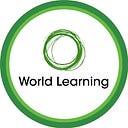World Learning Algeria Helps Advance the UDL Field with New White Paper
By Eric House

Last month, World Learning Algeria partnered with international inclusive education advocates to publish a white paper on Universal Design for Learning (UDL). The paper, titled “Universal Design for Learning (UDL): Impact on Policy, Practice, and Partnership for Inclusive Education,” is at the forefront of efforts to expand the knowledge and practice of UDL in international development education.
The UDL approach adapts teaching to all learners and their diverse individual needs to reduce barriers to learning. It stems from the principle that all learners, regardless of their needs or background, must have ample opportunities to learn, set goals, and gain skills for the future.
Led by country representative and program director Leah Bitat, World Learning Algeria has practiced UDL across its diverse portfolio of projects for the past 10 years in Algeria. The Algiers STEAM Center has presented on using UDL to reduce barriers to STEM education over the past three years at the Universal Design for Learning International Research Network Global Summits.
Bitat, who did her graduate work in education at Harvard University with David Rose, the founder of the UDL framework, is a member of the Global Campaign for Education Inclusive Education Steering Committee. She co-chaired a side event at the 2021 Global Education Summit with Dr. Loui Lord Nelson, another well-known scholar in the UDL field.
Joined by a diverse team of international education practitioners, the session included an interactive presentation on the impact of UDL on policy, research, education systems, and classrooms, and drove the need for the publication of a white paper to capture the knowledge shared.
“Universal Design for Learning (UDL): Impact on Policy, Practice, and Partnership for Inclusive Education” is the first white paper to capture insights on the impact of UDL in international education efforts through a knowledge-sharing event, rather than a literature review or independent study. The quality of the paper reflects how a diverse set of practitioners and participants came together from around the world to advance the knowledge and application of UDL.

The paper aims to move the discussion on UDL from broad-based theoretical recommendations to practical insights on implementation. It amplifies real-world recommendations by practitioners to increase impact in their current initiatives.
“The beauty of UDL is that it is a design framework, not a theory or product,” says Bitat. “It can be adapted to any educational environment. Because of that, UDL has experienced rapid application across World Learning Algeria’s project sites due to the positive impact that UDL-designed learning environments bring — not just to the students who learn in them, but especially for the teachers that feel a heightened sense of efficacy as creators of inclusive learning environments.”
With its recommendations for real-world application, “Universal Design for Learning (UDL): Impact on Policy, Practice, and Partnership for Inclusive Education” ensures that international development education sees more inclusive learning environments for students worldwide.
To learn more and access the white paper, click here.









